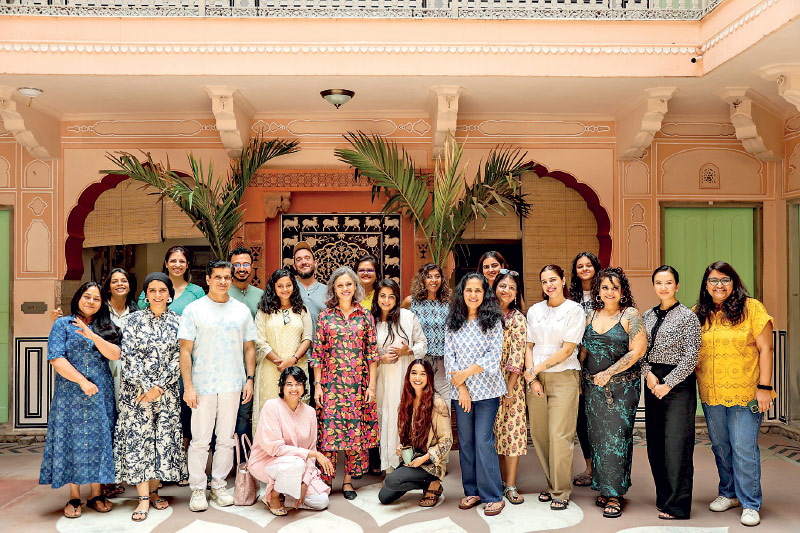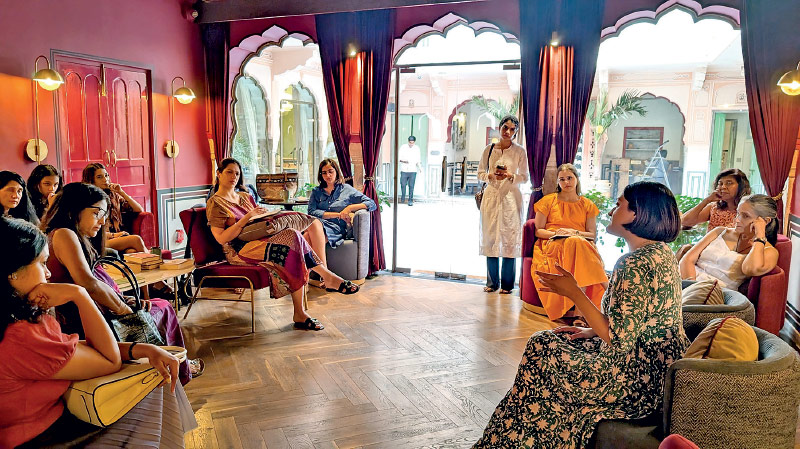Monday Feb 23, 2026
Monday Feb 23, 2026
Thursday, 4 September 2025 02:37 - - {{hitsCtrl.values.hits}}

Participants and resource persons of Chapter Two Writer’s Retreat – The Art of Storytelling held at Padmaa, Jaipur

Chapter Two Writer’s Retreat – The Art of Storytelling
|
Siyahi Founder and CEO Mita Kapur
|
|
Chapter One Writer’s Retreat – Crafting unforgettable romantic stories
|
In a literary landscape where many Sri Lankan authors are content with selling a thousand copies of their book locally, Indian literary agent Mita Kapur is demonstrating a more expansive and immersive path to creative development. Through her company Siyahi, Kapur has been conducting intensive writers’ retreats that are creating ripple effects far beyond their eight-day duration.
With two decades of experience as a literary agent and having served as literary director for the prestigious JCB Prize for five years (an Indian literary award that recognises distinguished works of fiction), Kapur brings a unique perspective to the challenges facing contemporary writers in South Asia. Her appointment as curator for the Ceylon Literary Festival, both for this year and next, positions her as a bridge between the Indian and Sri Lankan literary landscapes.
Small numbers, maximum impact
Kapur’s writers’ retreats deliberately limit participants to small groups. 15 for the first retreat focused on romance writing, and 20 for the second covered general creative writing and editing. This intimate setting allows for what she describes as “micromanaged” attention from mentors, ensuring each participant receives personalised guidance on their specific challenges, whether in character building, plot development, or research methodology.
“We didn’t want it to be a large group simply because people think the larger the number, the more successful it is,” Kapur explains. “We designed the retreats so that a small number of people would get the maximum impact, with each participant able to get time with each of the mentors on a one-on-one basis.”
The results have exceeded expectations. Participants have formed lasting connections, continuing to collaborate and support each other long after the retreats end. WhatsApp groups remain active with ongoing exchanges about writing projects, and many participants have begun meeting in person to continue their creative partnerships.
The conduit between author and publisher
One crucial area Kapur’s retreats address is editing – a skill she identifies as lacking across the industry. The second retreat placed particular emphasis on this area, recognising that strong editing is essential for the final outcome of any book.
“Editing is where our publishing industry really lacks,” Kapur notes, an observation that resonates strongly with the Sri Lankan literary scene where quality editing remains a significant challenge.
As a literary agent, Kapur serves as a bridge between authors and publishers, handholding writers from manuscript development through to contract negotiations, marketing oversight, and even screen adaptations. Her work spans multiple levels: domestic English markets, language translations, and international English rights.
This comprehensive approach offers valuable insights for Sri Lankan authors who, as the conversation reveals, often remain satisfied with limited local sales rather than exploring broader markets in the subcontinent and beyond.
“We act as conduits between the author and the publisher,” Kapur explains. “We work with authors to elevate manuscripts to become pitch-worthy for mainstream and independent publishers, then monitor everything from editing quality to marketing effectiveness and sales performance.”
Organic growth over corporate formulas
What sets Kapur’s approach apart is its deliberately organic nature. Rather than following corporate targets or rigid formulas, she allows each retreat to evolve based on the needs of participants and the creative demands of different genres. Her third retreat will focus on historical writing, while future plans may include a Hindi-language retreat.
“I don’t function like a corporate or company. We are very organic in our approach,” she says. “In a creative field, I can’t have targets, goals and numbers. What we will do, we will do to the best of our capacity so that we deliver what we promised, or maybe more.”
Lessons for Sri Lankan authors
Addressing concerns about declining readership, Kapur offers a nuanced perspective that could encourage Sri Lankan authors worried about market viability. She argues that reading habits have evolved rather than disappeared, with people consuming stories through podcasts, audiobooks, and digital media.
“People are reading differently, for sure,” she observes. “Human life cannot exist without us telling each other stories. Stories are conveyed through various mediums – through technology, through AI, through history, through social media. Stories are stories, whatever the medium may be.”
Kapur’s work offers several key insights for Sri Lankan writers looking to expand their reach. She says they need to focus on Quality over Quantity, and note that the success of small, intensive workshops suggest triumph of deep personalised development over large-scale, superficial programs.
Investing in personalised development means understanding the full publishing ecosystem – from editing to marketing to international rights – is crucial for authors serious about broader success. The lasting connections formed between retreat participants demonstrate the value of peer networks in sustaining writing careers, building author writer communities.
Rather than lamenting changes in reading habits, successful authors embrace the change, adapting their approach to reach audiences through multiple channels.
Thinking beyond local markets is another factor Kapur stresses on. While local success has its place, authors serious about their craft should consider the broader opportunities available in regional and international markets.
Looking ahead
As Kapur prepares to curate the Ceylon Literary Festival for the second time, her presence in Sri Lanka at the beginning of next year will be an opportunity for local authors to connect with broader literary networks. Her emphasis on organic growth, quality mentorship, and professional development offers a roadmap for Sri Lankan writers ready to move beyond the comfort zone of local markets.
The success of her retreats, measured not in immediate commercial returns but in the transformed energy and commitment of participants, suggests that Sri Lankan authors hungry for professional development and international exposure might benefit from similar intensive, personalised approaches to literary development.
Mita Kapur will serve as curator for the Ceylon Literary Festival in February 2025. Her agency Siyahi continues to represent authors across multiple genres and markets, while planning additional writers’ retreats throughout the year.